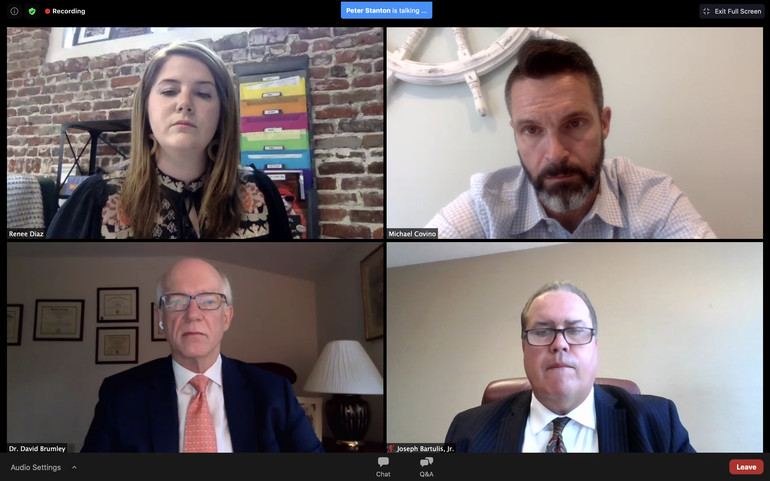As businesses throughout Central Massachusetts go back to operations, there are many legal and safety precautions they have to keep in mind and follow.
Panelists discussed the ins and outs of reopening on WBJ’s webcast “Back to Business” on Wednesday: Joseph Bartulis, chair of the labor and employment law practice group at Worcester Fletcher Tilton PC, Dr. David Brumley, vice president of medical affairs at Worcester insurer Fallon Health, Renee Diaz, owner of Worcester bakery The Queen’s Cups, and Michael Covino, president of Worcester restaurant parent company Niche Hospitality Group.
Bartulis first covered the legal areas employers are most vulnerable to in resuming operations.
Amongst these were wage laws and safety laws. He stressed how employers must consider all wage laws apply no matter where the employee is physically working and all worked time must be paid for.
Working from home can blur the boundaries for hourly wage workers and employers must make sure they are compensating workers for all time worked, which includes answering emails, texts, and even required COVID-19 screenings.
In order to avoid wage-and-hour law violations, Bartulis suggested employers keep accurate employee records and time logs, pay overtime, and approve properly requested leave time.
Bartulis touched on how employers need to consider the WARN Act and giving employees 60 days notice before layoffs, though the exemption of unforeseen business circumstances can help businesses evade this requirement.
Key safety laws will be implicated because of the pandemic include Massachusetts Commission Against Discrimation claims, Americans with Disabilities Act claims, and Occupational Safety and Health Administration claims.
MCAD claims can be implicated if businesses fire or lay off an employee in a protected class. Employers must be able to prove the job action was not taken because of their protected claim status.
This also applies to employees with disabilities.
Employees can file OSHA claims if the workplace is unsafe and violate regulations so businesses must make their spaces safe for employees to work in.
Another way businesses can stay safe is understanding they can require screening before entering and require employees to get COVID-19 tests. As an employer, you are allowed to make people establish they are healthy enough to work.
Brumley said if someone does test positively, it is important to disinfect the office, do some internal contact tracing, and notify the employees. However, the employer should not give up information about who the positive person is.
Brumley further discussed Fallon Health’s office policies, how it is keeping employees safe, and good tips for other businesses whose offices are reopening.
He said Fallon is working to address the four major safety categories, social distancing, hygiene protocols, staffing and operations, and cleaning and disinfecting.
There are checklists, best practice resources, and posters for businesses that can be found on the mass.gov website.
Brumley emphasized communication is a key part of reopening safely. A large part of this is providing educational tools and resources about COVID-19 and about necessary hygiene protocols and handwashing or hand sanitizing stations throughout the office.
Keeping clear cleaning logs was another tip from Brumley that is helpful and important to make sure the office space is disinfected.
A large part of getting your business ready to reopen is redesigning the space to allow social distancing.
Whether that be one way hallways or limiting the elevator to only three people at a time, Fallon Health has changed their space to meet federal requirements.
Both Covino and Diaz mimicked this, saying they have rethought their spaces in order for people to properly social distance within it. Diaz said she had to get a little creative and turned the dining area into the checkout area in order to have enough space.
Covino works in one of the industries with the biggest challenges: the restaurant industry.
He said at first his restaurants went to take-out only and reduced its number of restaurants from 10 to four, but eventually had to shut down completely in order to reset and create adequate guidelines for employees and customers.
Covino used this reset time to create guidelines and protocols and turn them into what he labeled as playbooks to give clear outlines internally to employees and externally to customers to increase safety.
Both Covino and Diaz said customer-facing businesses will look and act differently, but it is important to find ways to keep people safe while trying to stay true to the atmosphere and character of your business.
There are a lot of legal issues and safety measures to keep in mind when reopening, but all panelists stressed the safety of employees must come first to protect them and your business itself.

